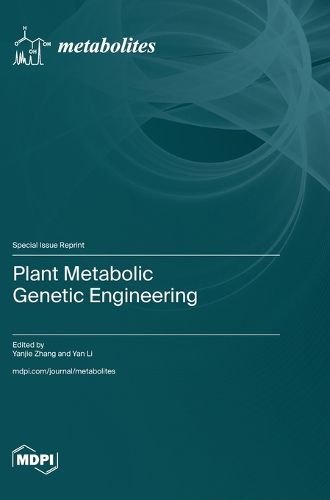Readings Newsletter
Become a Readings Member to make your shopping experience even easier.
Sign in or sign up for free!
You’re not far away from qualifying for FREE standard shipping within Australia
You’ve qualified for FREE standard shipping within Australia
The cart is loading…






This title is printed to order. This book may have been self-published. If so, we cannot guarantee the quality of the content. In the main most books will have gone through the editing process however some may not. We therefore suggest that you be aware of this before ordering this book. If in doubt check either the author or publisher’s details as we are unable to accept any returns unless they are faulty. Please contact us if you have any questions.
Plant metabolic engineering is an effective strategy to produce desired chemicals, enhance natural compound yields, and design novel metabolites through genetic modifications. This Reprint comprises 10 studies addressing critical challenges in metabolite identification, key gene isolation, and precise genome engineering for plant metabolic pathways.
The contributions emphasize using innovative technologies to accelerate metabolite discovery and optimize biosynthesis. Examples include the use of transcriptional repressor SmMYB4 in balancing phenolic acid and tanshinone production in Salvia miltiorrhiza; integrated metabolomic-transcriptomic analysis, which reveals carotenoid regulation in sweet potato; and using CRISPR-driven validation of SlbHLH22 to enhance tomato salt tolerance. The research spans medicinal plants (e.g., Fritillaria taipaiensis alkaloid biosynthesis) and crops (yam dormancy mechanisms), demonstrating systems biology approaches to refine metabolic engineering targets.
These works align with the Special Issue's goal to develop "green cell factories" for sustainable solutions. By combining synthetic biology tools (gene editing and enzyme engineering) with quantitative metabolite analysis, the studies reduce wet-lab experimentation and advance applications in agriculture (stress-resilient crops), pharmaceuticals (high-yield medicinal compounds), and industrial biosynthesis. This Reprint underscores how plant metabolic engineering can address global challenges in food security and environmental sustainability.
$9.00 standard shipping within Australia
FREE standard shipping within Australia for orders over $100.00
Express & International shipping calculated at checkout
This title is printed to order. This book may have been self-published. If so, we cannot guarantee the quality of the content. In the main most books will have gone through the editing process however some may not. We therefore suggest that you be aware of this before ordering this book. If in doubt check either the author or publisher’s details as we are unable to accept any returns unless they are faulty. Please contact us if you have any questions.
Plant metabolic engineering is an effective strategy to produce desired chemicals, enhance natural compound yields, and design novel metabolites through genetic modifications. This Reprint comprises 10 studies addressing critical challenges in metabolite identification, key gene isolation, and precise genome engineering for plant metabolic pathways.
The contributions emphasize using innovative technologies to accelerate metabolite discovery and optimize biosynthesis. Examples include the use of transcriptional repressor SmMYB4 in balancing phenolic acid and tanshinone production in Salvia miltiorrhiza; integrated metabolomic-transcriptomic analysis, which reveals carotenoid regulation in sweet potato; and using CRISPR-driven validation of SlbHLH22 to enhance tomato salt tolerance. The research spans medicinal plants (e.g., Fritillaria taipaiensis alkaloid biosynthesis) and crops (yam dormancy mechanisms), demonstrating systems biology approaches to refine metabolic engineering targets.
These works align with the Special Issue's goal to develop "green cell factories" for sustainable solutions. By combining synthetic biology tools (gene editing and enzyme engineering) with quantitative metabolite analysis, the studies reduce wet-lab experimentation and advance applications in agriculture (stress-resilient crops), pharmaceuticals (high-yield medicinal compounds), and industrial biosynthesis. This Reprint underscores how plant metabolic engineering can address global challenges in food security and environmental sustainability.